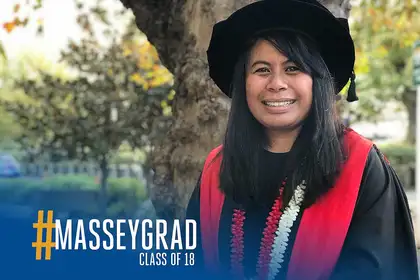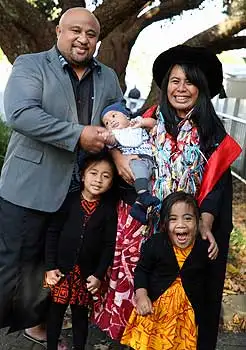
Dr Nicola Fa'avale graduated with her Doctor of Philosophy at last month's graduation ceremony in Auckland.
Mainstream measurements of children’s physical activity do not effectively capture the cultural influences of parenting and its impact on children’s play and travel.
For her thesis, Dr Nicola Fa’avale investigated the impact of Sāmoan parenting practices on their children's physical activity. She graduated with her Doctor of Philosophy from Massey University’s College of Health last month.
“I was really interested in how Sāmoan parenting practices here in New Zealand impact our children. There was a definite mix of western and Sāmoan cultural influences on children, which highlighted the need to interrogate whether tools that measure play, independent mobility and physical activity were appropriate measures for Sāmoan children, especially as they inform societal parenting norms and create unnecessary pressures for Sāmoan parents.”
Dr Fa’avale, who is of Sāmoan, Niuean and Tongan heritage, also wants to see more culture injected into the design of streets, neighbourhoods and playgrounds. “Urban planning and social cohesion in neighbourhoods is really important. I would really love to see the various cultures of the residents of neighbourhoods incorporated in planning – kids being able to see aspects of where they come from and being able to utilise that in their play. For instance, having a vaka in the playground is symbolic of who they are and where they come from. These can be a platform for all-important conversations about identity and belonging and shows members of these communities that they are valued and validated within the spaces in which they live.”

Dr Fa'avale with her husband Andrew and children Auro (4), Felani (3) and Selemaea (3 months).
Dr Fa’avale is now based in Brisbane and finished her PhD via distance. She also has a Bachelor of Health Science, a Postgraduate degree in Public Health and a Master of Public Health.
She is currently working as a researcher at the University of Queensland, investigating Māori and Pasifika health. “It’s really great that positive health and wellbeing is deemed important for our community in Brisbane and is on the agenda in Australia.”
She also runs a consultancy business 3Wiiise Group, and not-for-profit organisation MANA Community Mentoring Inc. which she founded with her husband Andrew and some friends.
The 31-year-old mother of three, formerly of Manurewa in Auckland, met her husband through Massey University. “We met at Massey, on a writing retreat for postgraduate Pasifika students. So apart from the academic journey, Massey has a really special place in the life of our family,” she says.
“I would like to thank my friends and family, the Sāmoan parents involved in my research, my own parents John and Addy Tava’e and siblings John-Henry and Grace, my husband Andrew and of course my children – they have been really patient with mummy. A special thanks goes out to my amazing supervisory team Dr Lanuola Asiasiga, Dr Penelope Carroll, Professor Karen Witten and the team at SHORE and Whāriki Research Centre.”